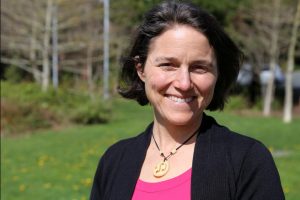Faculty Interview

Associate Teaching Professor & Associate Director, Program on the Environment
University of Washington
What were the benefits of leading a study abroad program in Morocco?
Morocco is an incredible country that is safe, welcoming, and diverse in so many ways – linguistically diverse, geographically diverse, architecturally diverse, and culturally diverse. In this relatively small country, students can visit beautiful, highly developed cities (with better public transit and roads than most of the USA), see incredible arts and architecture, eat delicious food, visit Ancient Roman ruins, experience rural farming communities, and spend time in the “great outdoors” (in mountains and beaches). Students can enjoy unbelievable Moroccan hospitality through homestays and just by talking with people in markets and cafes or through course programming. Academic foci of programs can be as diverse as the country – agriculture, development, language, sustainability, women and families, migration, and history – these are just a few ideas off the top of my head!
How did having your program in Morocco impact your students?
My students, some of whom had never traveled outside of the United States, really got to know Morocco in the three weeks we spent there. They felt safe, comfortable, and open to learning. They reflected in writing regularly about what they were learning and noticing. Students thought a lot about beauty, the value of time, goals of development, and how effective development might be defined really differently depending on who is doing that defining. Students engaged deeply with Moroccan ideas about food, farming, and food systems. Students learned so much about Moroccan systems for taking care of one another, and how hospitality encourages you to slow down and connect more deeply with family, friends, and people you are interacting with for only a few minutes. Students saw many different farms and heard about sustainable agriculture and sustainability from farmers and practitioners – with very different approaches and experiences than those in the U.S. Experiencing the diversity, sense of welcoming, and infrastructural advancement in Morocco helped many students see just how U.S.-focused their education has been – and how much they can learn from Morocco, North Africa, and the world.
What tips and recommendations do you have for planning a program in Morocco?
Planning a program takes time – so make sure you start thinking about this in advance! Think seriously about learning objectives for your students and how to best accomplish them – ideally by talking with MOBT staff! You also want to think about scheduling downtime so that students have some time to rest, reflect, and be fully engaged for the next session. It is hard to schedule downtime but I think so helpful! Also, I HIGHLY recommend homestays for at least a portion of the program and staying in a riad for at least a few nights. Finally, I recommend talking about managing attention/harassment for women AND tips and ways to reduce the likelihood of diarrheal disease. Encourage students to talk with their doctors about bringing an antibiotic AND when/how to take it.
Why do you think it is important to work with a provider when planning a program in Morocco?
I have spent quite a bit of time in Morocco, including living there for two years 25 years ago as a young adult. I can speak a little Moroccan Arabic and more Tashelheet, have a good sense of geography and prices, and have a lot of contacts there. AND THERE IS NO WAY I COULD ORGANIZE AN EFFECTIVE STUDY ABROAD PROGRAM. Having MOBT Global work out all of the details, find great food and accommodations, connect with the people I recommended, AND find new contacts, allowed me to focus entirely on the academic goals of the program. AND having MOBT Global Staff on the ground with us in Morocco was amazing for keeping track of the myriad necessary details and for helping with medical or other unexpected situations. AND – the homestay parts of the program were so wonderful, and there is no way I could have organized that on my own.
What makes Morocco a unique destination for faculty-led programs?
I don’t know what else to say. Morocco is such a special place – an African nation but so deeply connected historically and today with Europe and the Middle East. Diverse in so many ways, very developed but also developing rapidly, safe, welcoming, and wonderful.
What were the highlights of your most recent program in Morocco?
Too many highlights to list: staying with families in Rabat is number one! One day, I was walking through the medina and ran into several of my students talking and laughing with their homestay “moms.” In one case, holding hands with their five-year-old “brother” made me feel SO HAPPY that we could provide this opportunity for students to truly get to know Moroccans in their homes. Visiting an organic farm near Rabat and eating delicious food grown and prepared entirely on the farm – UNBELIEVABLE. Visiting the ancient city of Fes and exploring the mountains and agricultural valley of Ait Bouguemez – every day was SO RICH during our three weeks there. We were in Morocco, in the High Atlas mountains, during the earthquake – so our program did not go entirely as planned. BUT – seeing the way Moroccan communities pitched in to support one another in a time of crisis was also beautiful. Knowing we had MOBT Global to help us make alternate plans was great. We felt engaged, curious, safe, and supported the entire program.
